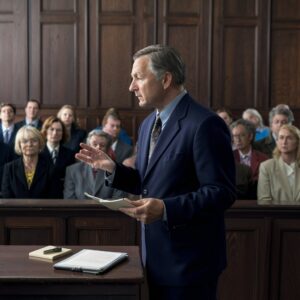Understanding the Importance of Jury Selection in Oklahoma Cases

Jury selection, also known as “voir dire,” is a crucial component of the legal process in Oklahoma. Ensuring a fair trial hinges significantly on selecting an impartial jury. This article provides insights into the jury selection process and defense strategies.
Impartial Jurors and the Elimination of Bias in a Jury
The primary goal of jury selection is to assemble a group of jurors who can judge your case objectively, without any bias or preconceived notions. This ensures that you receive a fair trial, a fundamental right under the U.S. Constitution. In Oklahoma, as elsewhere, both the defense and the prosecution have the opportunity to question potential jurors and challenge those they believe cannot be impartial.
During voir dire process, attorneys for both sides ask questions of potential jury members with the aim to identify and eliminate those who may have biases based on their backgrounds, experiences, or attitudes.
This process helps to mitigate the risk of prejudice affecting the jury’s verdict. For instance, questions may be asked to uncover any racial, ethnic, or socioeconomic biases, which are critical to address given Oklahoma’s diverse population. These questions are tailored for the particular case and for the particular juror. For example, if the case in question revolves around a theft, the defense attorney may ask a potential juror if they have ever been the victim of a theft.
Community Representation: A Jury of Your Peers
The phrase “a jury of your peers” refers to the constitutional right to be judged by an impartial group of individuals from the community, reflecting a cross-section of society. This concept is rooted in the idea that a defendant should be judged fairly by ordinary citizens who bring diverse perspectives and common sense to the deliberations, rather than by a biased or homogeneous group.
In Oklahoma, achieving a representative jury can be challenging due to the state’s varying demographics, but it is vital for the legitimacy of the judicial process.
Legal Strategies in Jury Selection
Jury selection is also a strategic phase for attorneys. Each side tries to select jurors who they believe will be sympathetic to their arguments or who will be open to their interpretation of the evidence. In Oklahoma, attorneys might consider local attitudes toward law enforcement, views on crime and punishment, or other regional sentiments that could influence a juror’s decision-making process. Here are some of the strategies that attorneys may choose to use in jury selection.
Attorneys often begin by analyzing the demographic characteristics of the potential jury pool. This includes understanding the general makeup of the community where the trial is taking place. Factors such as age, gender, occupation, education level, and socioeconomic status can influence perspectives and biases.
Knowing the prevailing attitudes and beliefs in the community can help in predicting how jurors might perceive the case. For example, in a community with strong support for law enforcement, potential jurors might be more sympathetic to the prosecution in a criminal trial.
Attorneys often use open-ended questions to encourage jurors to speak freely and reveal their true thoughts and feelings. For example, “How do you feel about the criminal justice system?” can provide insights into a juror’s potential biases. Presenting hypothetical scenarios related to the case can also help identify how jurors might react to the evidence or arguments.
Challenges to Potential Jurors
Both sides can challenge a juror for cause if they believe the juror cannot be impartial. Reasons might include personal relationships with the parties involved, strong preconceived notions about the case, or explicit biases. Each side also has a limited number of peremptory challenges that allow them to dismiss jurors without providing a reason.
Developing a Juror Profile Can Be Crucial
Attorneys often develop a profile of the ideal juror based on the specifics of the case. This makes it easier to make decisions quickly during the voir dire process. For instance, in a personal injury case, an ideal plaintiff’s juror might be empathetic and have a history of supporting plaintiffs in civil cases.
In questioning potential jurors, your attorney may pay particular attention to non-verbal cues, such as signs of discomfort, disengagement, facial expressions or tone of voice that might indicate underlying biases or strong opinions about the case.
Some attorneys use professional jury consultants to help them with this process. Jury consultants are usually highly skilled professionals who work in the psychological field. Attorneys may also research potential jurors’ backgrounds, including their social media presence, to uncover any information that might indicate bias or preconceived notions.
Your attorney may use voir dire as a time to build rapport and humanize the client in empathetic ways with potential jurors during voir dire. This involves being personable, respectful, and genuine to create a positive impression and foster a sense of trust.
The integrity of the jury selection process is crucial for maintaining public confidence in the legal system. If the public perceives that juries are selected unfairly, it can undermine trust in the judicial system as a whole. Therefore, the courts take extra precautions to ensure that jury selection is fair and that an impartial jury is empaneled. If you or a loved one are headed for a jury trial, discuss the jury selection with your Tulsa criminal defense attorney to make sure that you understand how this process can help your case.
Consult with a Tulsa Criminal Defense Attorney
This is a critical juncture in a criminal case. Consulting with an attorney can help you protect your rights and freedom. Consult with a Tulsa criminal defense attorney at the Tulsa Criminal Defense Law Firm. Call today at 918-256-3400. We can provide personalized guidance based on your unique situation.
We are dedicated to providing reliable legal advice and representing clients throughout the criminal process. Together, we can navigate the complexities of the criminal court process and work towards a positive outcome.
